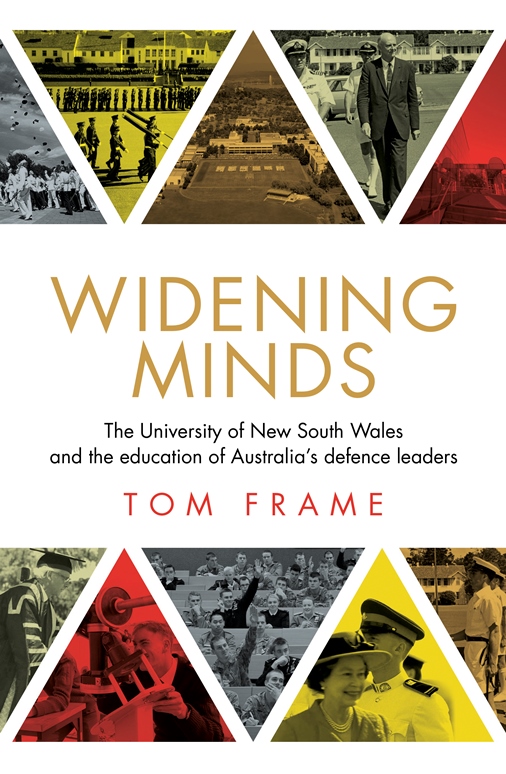The partnership between the service colleges and the University of New South Wales has been long and productive. Indeed, it represents the longest educational partnership in Australia. Tom Frame is an ideally suited author to commemorate this 50-year association and the involvement of over 25 000 students.

Paperback 544pp RRP: $59.99
Do Australian full-time military officers require a tertiary education? The question is important. It has been answered in the positive many times by military and political enquiries and reports. Should that education be at a university or at a military establishment? This question has been more debatable but largely resolved to favour the latter. Should the education be joint or single service? The answer determined has been joint with tangible and measurable benefits but with some lesser costs to ‘tradition’. This book traces these key issues and their resolution and it does so with admirable clarity.
The participants in this debate are diverse. Senior military officers in the 1960s were predominantly unlikely to have has tertiary qualifications, though some, as Frame recounts, realized that this had disadvantaged them. Academics at the service colleges – for they all had academic syllabi – came from the post-Second World War generation. Though they were very competent, they suffered from a surfeit of higher degree qualifications as was the norm for the period. In many cases this led to demotions from professor to associate professor as new appointees arrived from a higher degree-rich generation. These academics had an understandable concern for the preservation of their conditions of service, sometimes at odds with the universities. The universities – and several were involved – were hard to class attitudinally. There was both reasoned support and trenchant opposition to marriages between the military and the universities. Academic freedom remained a key issue. Attendance at a ‘proper’ campus was a debated topic. Disdain for ‘military thinking’ (whatever that may be) was a common factor in a generation of university administrators somewhat removed from the experience of the Second World War. The Vietnam War and conscription muddied the waters in an era of university activism.
As well as those choosing and refining the outcomes, a further group of individuals were greatly affected by the negotiations between defence and the universities. For example, students at the Royal Military College who entered in 1965 and were able to pursue the ‘degree’ (rather than the ‘diploma’) course offered felt that they were promised accreditation for their efforts. It was not forthcoming. These students felt that they had earned a degree but that both the University of New South Wales and the Army insufficiently advocated their case. The reviewer was a victim of this shortcoming.
That the marriage between the University of New South Wales and the Australian Defence Force Academy (ADFA) took place and has been productive is a minor miracle. There have been casualties in the relationship. Casey University was one. Development of a suitable ethos for a newer military generation and its strong female component has been too slow.
The book covers not only the foundation of ADFA but also its progress to the present time. It examines the developing relationship between the Department of Defence and the University and between the diarchy of the Commandant and Dean. It does not avoid the controversies arising from the behaviour of the cadets.
This is a readable, balanced and authoritative book. It recounts the disputes, often prolonged, between and within the defence force and the universities. It is a story governed, not surprisingly by personalities: academic, military and political. There were principled behaviors and stubborn ones, dogged determination and quickly-won compromises. Several of the key participants do not cover themselves in glory, but Frame’s diplomacy leaves some of this interpretation to the reader who may have to interpret between the lines of his factual but interpretative narrative.
Reviewed by Mike O’Brien for RUSIV January 2018
Contact Royal United Services Institute about this article.






